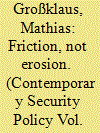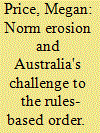| Srl | Item |
| 1 |
ID:
153887


|
|
|
|
|
| Summary/Abstract |
Reframed as “targeted killing,” state-sponsored assassination is moving toward normalization. I maintain that this development can only be understood in the context of long-standing frictions between meta-norms. The regulation of assassination as an instrument of foreign policy is a normative amalgam that is connected to both state sovereignty and liberal thought. Those discursive links structure both the evolution of the norm and its transformation, as they can be invoked by actors in order to reinterpret and reshape it. As I argue, the prevalent “norm erosion” perspective fails to grasp such incremental processes in that it tends to limit its analytical view to single, narrowly defined norms and overemphasizes external shocks. I thus stress the need for a more comprehensive account of normative change that highlights the surrounding meta-norms that are able to connect single norms to their larger position within the international order.
|
|
|
|
|
|
|
|
|
|
|
|
|
|
|
|
| 2 |
ID:
184767


|
|
|
|
|
| Summary/Abstract |
Australian foreign policy makers increasingly place an emphasis on the importance of rules and norms. These foreign policy statements reflect concerns about China's growing assertiveness combined with the belief that a ‘thick’ anarchy is safer for middle powers. Yet while Australia has been fixated with how China poses a threat to the international order, at times, Australia has actively challenged that order itself. Such was the case when the Prime Minister gave an address on ‘negative globalism’ at the Lowy Institute in October 2019. This article advances a theoretically grounded framework for understanding how these performative challenges arise and come to cause norm erosion. The framework draws together three elements: the rule or norm in question; representational strategies; and domestic audiences. The article illustrates this framework using the example of the Prime Minister's Lowy Institute address.
|
|
|
|
|
|
|
|
|
|
|
|
|
|
|
|
| 3 |
ID:
164457


|
|
|
|
|
| Summary/Abstract |
The introduction develops this special issue's main research question: under which conditions are challenges to norms likely to decrease their robustness? The issue presents current research on contestation and norm robustness and discusses its limitations. We conceptualize a norm's robustness by examining both the practical and discursive dimensions. Robustness is high when norm addressees express widespread discursive acceptance of a norm's claims (validity) that also generally guide addressees’ actions (facticity). When normative claims are discursively rejected by most addressees and do not guide their actions, robustness is low. The contributions develop four broad indicators for measuring robustness (concordance, third-party reactions to norm violation, compliance, and implementation). The norms analyzed here were not easily eroded; despite direct challenges, they remained surprisingly robust. This indicates that norm robustness is not determined by the relative power of norm challengers, but rather types of contestation and structural factors. These include being embedded in larger normative structures, institutionalization, and legal character, although effects of these factors are more ambivalent than norm research has usually supposed.
|
|
|
|
|
|
|
|
|
|
|
|
|
|
|
|